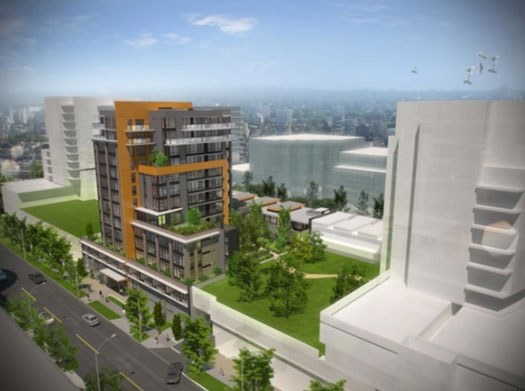Developer fees set to double for some housing projects
GRAEME WOOD / RICHMOND NEWS
SEPTEMBER 15, 2015 05:24 PM

The city announced $19.8 million for a subsidized rental housing project on Granville Avenue. Basic rents will not exceed $850 per month. Photograph By Submitted
Richmond city council passed two measures Monday night aimed at increasing affordable housing in the city.
Developers building single-family homes on recently subdivided lots and new townhouses will be asked to pay twice the existing prescribed amount toward Richmond’s affordable housing reserve, according to a city report.
Home developments will be charged $2 per square foot, instead of $1 and townhouse developments will be charged $4 instead of $2.
Furthermore, apartment complexes with fewer than 80 units will be charged $6 instead of $4.
Ergo, a new 3,000 square-foot home on a subdivided lot will be charged $6,000.
The new fees will generate an additional $1.5 million per year, on average, for the next 25 years. In total, the city expects to collect $76 million to 2041.
Using that money, the city projects 1,978 affordable units, for low-income households, could be constructed between now and 2041 — up from 1,174 units had there been no change in the fees.
The money represents 20 per cent of the cost of those units with the other 80 per cent coming from private or senior government partnerships.
The city has used its affordable housing reserve cash to help build seniors housing at Kiwanis Towers and social and low-income housing at the under-construction Storeys project on Anderson Road.
Coun. Bill McNulty said the new charges do not go far enough.
“But it gives us leverage, more in the coffers and lots more opportunities to do other things,” he added.
The changes do not affect developments of more than 80 units, which will still be tasked to build five per cent of the complex as subsidized affordable housing units.
No one on council has asked for that charge to be changed. Earlier this year, developer Dana Westermark, speaking for the Urban Development Institute, a development industry stakeholder group, contended a hike in fees would be reasonable to account for market increases, however, the five per cent built units have continued to keep pace with inflationary costs.
The city contracted G.P. Pollo and Associates, a development consulting firm, to recommend the new charges, which were last set in 2007.
A city report indicates the 2007 single-family home charge was set at closer to $2 until a “compromise” with developers was made to set it at $1.
Other cities in the region negotiate affordable housing charges as part of community amenity charges, according to city staff.
Coun. Carol Day said it was good the city has a set policy for all developments.
“I think Richmond does a better job on this,” she said.
Coun. Derek Dang said the provincial and federal governments should fund more housing projects.
Coun. Ken Johnston called on the city to look at other forms of housing development.
Council unanimously passed the new fee structure.
Meanwhile, city council voted 8-1 to ensure secondary suites are built on at least half of all subdivided single-family home lots.
But should the lots be too small or not have adequate road access, parking space or services, developers can still choose a $2 per square foot contribution.
The report did not indicate details as to what constitutes an unqualified lot for a secondary suite.
City spokesperson Ted Townsend said there are no set guidelines; developers/builders will need to provide rationale to not build secondary suites; following that, should staff concur, council will have the final vote.
Coun. Alexa Loo voted against the policy, stating it will create more steps for developers, costing time and, thus, money and affordability.
She questioned the fact council will review each subdivided development vis-à-vis the secondary suite policy.
“We could end up with a lot of push and pull,” said Loo.
Day, however, said she liked how council would be more involved in specific developments.




